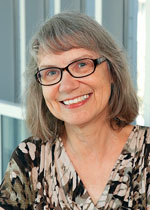Sub-plenary 5
From Zeno’s Paradoxes to Organizational Paradoxes: Tension, Ambidexterity and Change
Friday, July 3, 2015, 11:00–12:30Location: {tba}

Location: {tba}
Speaker:
Professor of Strategic Management
Cass Business School, City University London, UK
Speaker:

Professor of Management and Associate Dean
Lindner College of Business, University of Cincinnati, USA
Her research develops paradox theory in such diverse yet interwoven fields as innovation, organizational change, governance, and technology implementation. Her paper, “Exploring paradox: Toward a more comprehensive guide” received the Academy of Management Review Best Paper Award in 2000. Other publications appear in such top journals as the Academy of Management Journal, California Management Review, Organization Science, and Human Relations.
Speaker:
Assistant Professor of Management
Lerner College of Business and Economics, University of Delaware, USA
Wendy K. Smith received her doctorate in organizational behavior from Harvard University. Her research focuses on how leaders and organizations manage strategic paradoxes, and has been published in journals such as the Academy of Management Journal, Academy of Management Review, Organization Science, and Harvard Business Review.
Chair:
Chair in Strategic Management in Pluralistic Settings, Professor of Management, HEC Montréal, Canada

Ann Langley has research expertise in strategy, organizational change, health care management, and research methods.
Ann's current work deals with leadership collaboration, identity and strategic change in complex organizations from a process perspective.
Previous work has appeared in journals such as Academy of Management Review, Administrative Science Quarterly, Organization Science, Organization Studies, Journal of Management Studies, and Strategic Organization.
For this panel, Paula Jarzabkowski will discuss the theoretical and empirical potential of exploring paradox as an everyday practice. She will argue that, far from being remarkable, or exceptional, paradox is a pervasive characteristic of organizational life that needs to be considered as part of people’s everyday work. As such, actors have knowledgeable, often reflexive, practices for engaging with the paradox that is integral to performing their contradictory roles and tasks. She will consider some of these practices, such as the everyday practice of humor, and explain how a social theory of practice generates new theoretical insights for our understanding of paradox.
For this panel, Marianne Lewis looks forward to discussing the continuing evolution of a paradox lens. Organization scholars
continue to learn from its roots in early Greek and Far Eastern philosophy, as well as psychoanalysis. More recent work explores
leaders’ ability to think and manage paradoxically. Accepting the simultaneity, even complementarity, of competing demands,
managers may differentiate opposing forces to enable focus, and explore means of integration that enable synergy. The result,
she believes, is the potential for organizations to thrive in both the short- and long-term.
Paradox studies offer a meta-theoretical lens – providing insights to understand competing demands across varied tensions, phenomena and levels-of-analysis. A number of existing theories have adopted ideas from and contributed to our understanding of organizational paradox. In this session, Wendy will draw from existing studies to explore how paradox informs and is informed by other organizational theories.